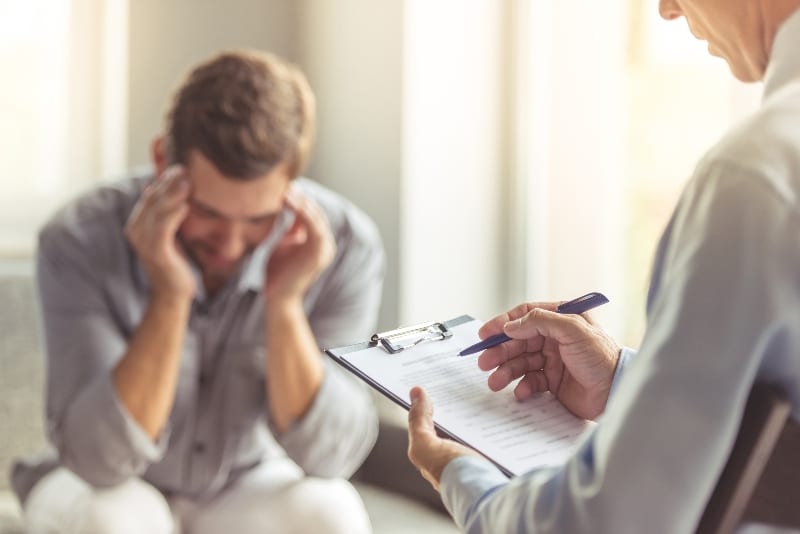The Importance of Veteran Mental Health
By Elizabeth Crain
5/10/2021
It’s hard to ignore physical injuries like a compound fracture, bullet wound, or a torn muscle. If you were physically injured, you’d go to the hospital, have surgery, and go through recovery and physical therapy. Unfortunately, for many veterans, mental health isn’t treated with the same level of care.
Your mental health is just as important as your physical health, but sadly, most veterans don’t get the mental health help they deserve.

In the same way that physical illnesses, such as a dislocated shoulder or a hernia, will not heal without medical attention, most chronic mental health conditions aren’t likely to get better on their own; they only begin to heal after first acknowledging the condition, then seeking out the help of a therapist or psychologist.
Choosing not to get treatment, or avoiding treatment for your mental health altogether, can create lasting damage.
So, why are veterans at higher risk for mental illness, and what can they do to cope with their mental health condition?
This post covers some of the most common mental health conditions vets are faced with and resources available to veterans and their families for their mental health concerns.
Why Is Veteran Mental Health at a Higher Risk?

The cause of mental health conditions for our nation’s heroes.
When it comes to veterans’ mental health statistics, one out of every four active-duty members show signs of a mental health condition. That’s more than the national average, which is only one out of every five civilians.
But what causes this higher risk for veterans?
While veterans can come from a wide range of duties and roles within the armed forces, one thing is constant – stress and pressure. The decisions you make while serving and the orders you follow are often, quite literally, life-and-death choices.

Related to this life-and-death pressure felt by those who serve is the sense of structure and camaraderie from fellow soldiers. The people you fight and serve alongside become a second family who you trust with your life. While it’s powerful to have a community and support group you trust and understand, it can be traumatic to lose those family members.
Between the grave choices, the life-threatening situations, and the loss of dear friends along the way, veterans are at a higher risk of experiencing emotional trauma—and that’s just during their service. Afterward, the transition back to civilian life carries its own difficulties and struggles, ones that frequently trigger or exacerbate mental health concerns.
The two most significant issues in veteran’s mental health are:
1) that veterans have a high rate of exposure to trauma and traumatic events, and
2) that they’re often the least likely to receive treatment.
As a result, many of our former servicemen and women are “walking wounded,” and the pain that these veterans experience is often only visible to those closest to them.
What Are Some of the Most Common Mental Health Conditions for Veterans?
1. Post Traumatic Stress Disorder (PTSD)

Post-traumatic stress disorder (PTSD) is one of the most common mental health conditions veterans have to face.
Two common misconceptions about PTSD are that:
- to have PTSD, you have to have been in the traumatic event yourself, and
- it requires a single, earth-shattering event.
The truth is that veterans can develop PTSD through:
- Direct exposure to a single traumatic event
- Long-term exposure to high-stress situations
- Witnessing the traumatic experience of another
- Learning that a relative or close friend was exposed to trauma

Finally, PTSD can even be the result of indirect exposure to the aversive details of the trauma. This means that although you weren’t there for the trauma, you saw direct, visceral effects of the trauma. This usually affects first responders, medics, and front-line servicemen and women.
2. Anxiety Disorders

Anxiety disorders are part of a larger category that encompasses a few smaller areas of diagnosis.
Having an anxiety disorder can include having:
- Generalized anxiety disorder
- Panic disorder
- Phobias
- Agoraphobia (a specific phobia tied to fears of being trapped in stressful or dangerous situations)
- Obsessive-compulsive disorder
- Social anxiety disorder (anxiety about being embarrassed, humiliated, rejected, or looked down on in social interactions)
- Separation anxiety disorder (fear and anxiety around being separated from those you are attached to)

3. Depression
Depression causes persistent feelings of sadness, hopelessness, and loss of interest. It is more than just feeling a little sad; it is an emotional weight that makes it hard to move, think, function, and fight against.
Dr. Mike Salvatore, one of Telemedica’s network providers and Quality Assurance team members, describes depression in the following way:

“Depression is usually experienced as a flattening of your thoughts, feelings, and body. With severe depression, one may not get out of bed and stop caring about basic things like changing their clothes, showering, and brushing their teeth. This causes many people to isolate themselves from others, lose interest in activities and hobbies they used to love, and become frustrated easily.”
– Dr. Mike Salvatore
Where Can Veterans Go for Veteran Mental Health Resources?
First and foremost, don’t let suicidal ideation go unaddressed. If you have suicidal thoughts, contact the National Suicide Prevention Lifeline (800-273-8255) or the Veterans Crisis Line (800-273-8255 and then press 1) today. You are not alone—people are ready and waiting to help you. The world would be all the poorer for your absence.
If you are a veteran who needs help with your mental health, or you are worried about a loved one, seek professional help. Everyone needs someone to “watch their six,” and few battles are as important as this one.
Think of your mental health just like your physical health. You would never willingly walk around with a broken hip or an infected wound, so don’t subject yourself to an untreated mental health condition.
Talking to a friend, pastor, family member, or fellow service member can be a good start. Think of it as first aid and triage for your mental health. Your support network is critical to your recovery, but it shouldn’t be the only steps you take to heal.
Instead, seek the help of competent medical and mental health professionals who can work with you to help you manage your condition. Often, receiving a mental health evaluation is the first step. Don’t give up hope. This isn’t an unwinnable battle, and you don’t have to fight it alone.
